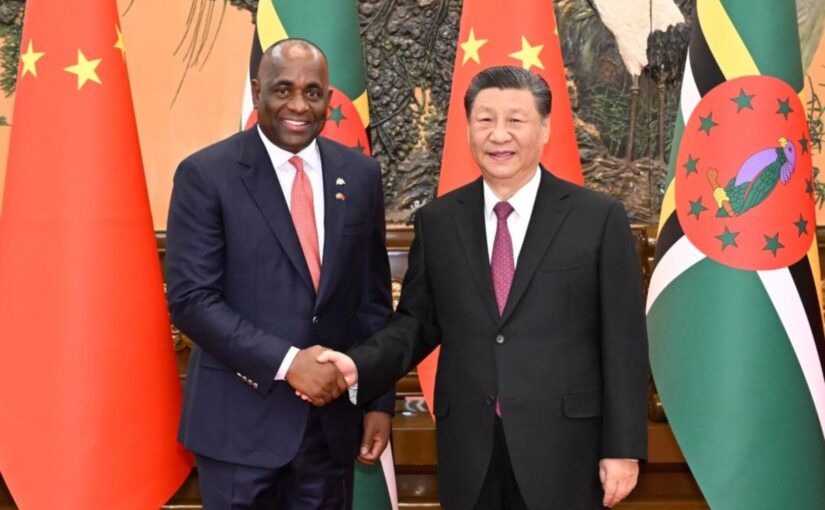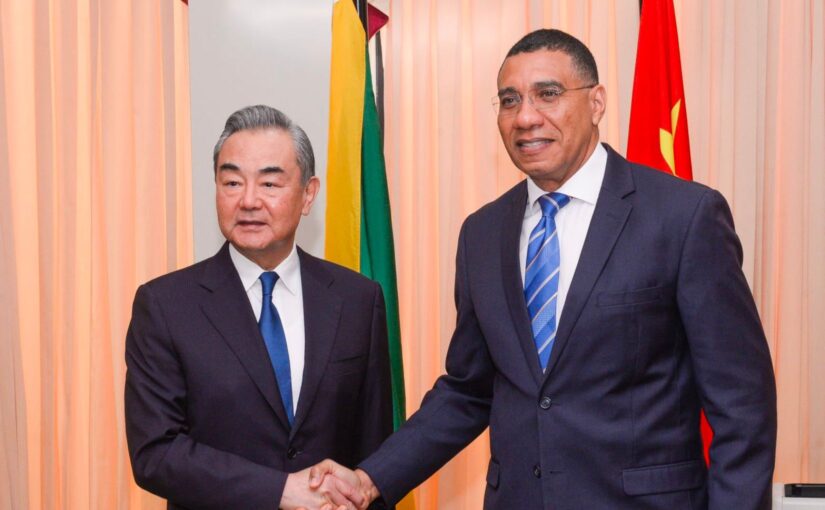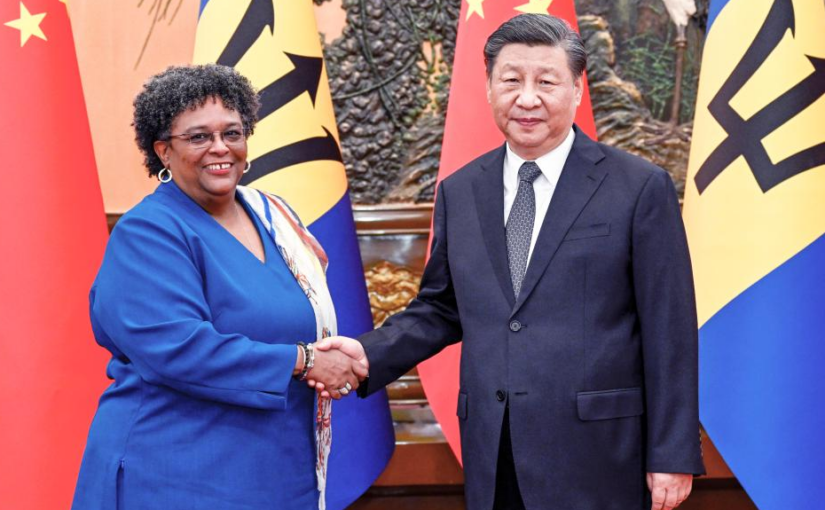Prime Minister of the Commonwealth of Dominica Roosevelt Skerrit paid an official visit to China from March 23-29 at the invitation of his Chinese counterpart Premier Li Qiang.
Announcing the visit on March 20, Chinese Foreign Ministry Spokesperson Lin Jian noted that this year marks the 20th anniversary of the diplomatic ties between the two countries, adding: “China welcomes Skerrit’s official visit at this special moment.”
Dominica is an important country in the Caribbean and also a good friend and partner of China in the region, he noted, adding that since the establishment of diplomatic relations 20 years ago, China-Dominica relations have grown steadily, setting a good example of mutual respect, equality, mutual benefit, common development and win-win cooperation between countries of different sizes.
“It is believed that Skerrit’s visit to China will further enhance political mutual trust between the two countries, promote practical cooperation in various fields, consolidate the traditional friendship between the two countries and push bilateral relations to a new level,” he added.
Meeting with Chinese President Xi Jinping on March 25, the Chinese leader told Skerrit that the the two countries have respected each other and treated each other as equals since the establishment of diplomatic ties 20 years ago.
With increasing political mutual trust, vigorous exchanges and cooperation in various fields, and with the deepening friendship between the two peoples, China-Dominica relations have become a good example of South-South cooperation, he added.
China highly appreciates Dominica’s steadfast friendship, Xi said. China is willing to work with Dominica to synergise development strategies and turn the friendly relations into a driving force for win-win cooperation to achieve more results and deliver more benefits for the two peoples.
Xi stressed that the key to the sound development of China-Dominica relations lies in a high level of political mutual trust, as well as in mutual understanding and support on issues involving each other’s core interests and major concerns. China firmly supports the people of Dominica in following a development path suited to their national conditions, and stands ready to bolster friendly exchanges and strengthen the sharing of experience on governance.
China welcomes the Dominican side to board the “express train” of Chinese modernisation and to expand bilateral cooperation in fields such as trade and the economy, infrastructure construction, agriculture and health care, Xi said, noting that China will continue to provide assistance within its capacity for Dominica’s economic and social development.
China is willing to promote cultural and people-to-people exchanges with the Dominican side, welcomes more Dominican students to study in China, and will continue to provide scholarships and training programs.
China advocates an equal, orderly, multipolar world and inclusive economic globalisation that benefits all, and it holds that all countries, big or small, are equal in the international community, Xi said.
Stressing that China attaches importance to the issues of Small Island Developing States related to climate change, Xi said that China supports Dominica in playing an active role in international and regional affairs, and stands ready to strengthen coordination and cooperation with the Dominican side, deepen South-South cooperation, safeguard the common interests of developing countries, and advance the construction of a community with a shared future for humanity.
China attaches great importance to its relations with Caribbean countries, Xi noted, saying that China appreciates Dominica’s important role in promoting China-Caribbean cooperation during the latter’s rotating chairmanship of the Caribbean Community (CARICOM), and that China will continue to support countries in the Caribbean to improve their prosperity, development and people’s well-being.
For his part, Skerrit said that he made the right decision to establish diplomatic relations with China 20 years ago, and that he was glad to visit China again on the 20th anniversary of the establishment of diplomatic ties between the two countries.
Noting that China has not only made great achievements in poverty alleviation and development, but also contributes significantly to the peace and development of Dominica, other Latin American countries and the world at large, Skerrit said that China’s support and cooperation has helped Dominica to safeguard its independence and development.
Skerrit commended the concept of building a community with a shared future for humanity and a series of global initiatives proposed by China, saying that they are crucial to improving solidarity and cooperation, and to the joint promotion of development and prosperity in today’s world.
He expressed Dominica’s willingness to be China’s all-weather strategic partner, and to continue playing a positive role in promoting relations between Caribbean countries and China.
Skerrit added that his country also expects closer communication and coordination on international affairs with China in order to safeguard international fairness and justice, and to make positive contributions to the promotion of world peace and development.
Establishing diplomatic relations with China was one of the first steps taken by Skerrit when he came to power and his meeting with Xi came just two days after the twentieth anniversary.
Marking the anniversary, Xi had exchanged congratulations with Dominican President Sylvanie Burton.
Depicting Dominica-China relations as dynamic and fruitful, Burton said that the Dominican side cherishes the friendship with China, appreciates China’s support and assistance, and is willing to deepen mutually beneficial cooperation to jointly tackle global challenges.
Also on March 25, Skerrit held meetings with Premier Li Qiang and Zhao Leji, Chairman of the National People’s Congress (NPC) Standing Committee.
Noting that this year marks the 20th anniversary of the establishment of diplomatic ties between China and Dominica, Li said the two sides have been treating each other with mutual respect and equality over the past 20 years.
He added that China is ready to work with Dominica to implement the important consensus reached by the leaders of the two countries, further strengthen political mutual trust, and push for the new and greater development of bilateral relations and cooperation.
Li said China has always supported Dominica in safeguarding its national sovereignty and independence, and in following a development path suited to its national conditions. China is willing to enhance cooperation with Dominica continuously in areas such as infrastructure construction, agriculture and trade under the framework of the joint construction of the Belt and Road. It is also ready to develop new highlights in cooperation on new energy and the digital and blue economies, help Dominica improve its disaster prevention and mitigation capabilities, and share more development opportunities.
He noted that China supports its enterprises in investing and doing business in Dominica, and it also welcomes Dominica and other Caribbean countries to actively participate in the fourth China-Caribbean Economic and Trade Cooperation Forum to open broader prospects for cooperation.
For his part, Skerrit said that Dominica and China have always respected each other, cooperated closely, forged a profound friendship and set a good example for the Latin America-China friendship. Dominica abides firmly by the one-China principle, and resolutely opposes the interference of any country in China’s internal affairs and the infringement of any country on China’s sovereignty.
He also said that China is committed to safeguarding world peace and promoting common development, and noted that the global initiatives proposed by China are receiving more and more support from the international community. Dominica is willing to strengthen communication with China further, increase personnel exchanges, expand cooperation, work together to deal with climate change, and promote the construction of a Dominica-China community with a shared future.
Zhao Leji said that China and Dominica are good friends and good partners sharing the same goals. He called on both sides to jointly implement the Global Development Initiative and promote the development of friendly and cooperative relations between China and Dominica.
During his visit, Skerrit also took part in the Boao Forum for Asia Annual Conference 2024, held on China’s southern Hainan island.
Addressing the opening ceremony, he said that the global community should work together to solve the challenges faced today and build a prosperous future.
“We need to work together to pull our strengths and move faster towards achieving peace and sustainable development. We need to strengthen cooperation and solidarity between countries in order to provide effective responses to the financial, economic, and social crises faced by many countries around the world.”
It is clear that sustainable development continues to be a pressing issue for the international community, given the high levels of inequality, poverty, and marginalisation among countries, he said, noting that inequalities between developed and developing countries persist and are widening.
Prior to embarking on his China visit, Skerrit gave an interview to China’s Xinhua News Agency in the Dominican capital Roseau. He said that, “”China has been a true friend of Dominica, and I would say an all-weather friend.” When Dominica was in difficult times, “China is always one of the first countries, which would come to our aid.”
In 2018, Dominica signed a memorandum of understanding with China to jointly build the Belt and Road. According to Skerrit, the Belt and Road Initiative (BRI) has opened up numerous opportunities not only for Dominica, but for many countries around the world to help with their economic independence and social development.
Skerrit said that under the BRI, Dominica has been actively working with China to set up agricultural technology cooperative projects in order to improve agricultural development, technology transfer and guarantee food security in the country.
Dominica has limited medical resources and the population has a long history of difficulty in accessing health care.
In his opinion, the construction of the Dominica-China Friendship Hospital, the introduction of new technologies and equipment, and the direct support by China in respect to its first cardiology department show “a dramatic improvement in the health care in Dominica as a result of the BRI.”
Many young Dominican students are attending universities in China and attaining their degrees in China. “Most of them are back here working in various fields, such as medicine, agriculture, architecture, environmental studies, international relations studies and psychology,” he said.
“We always say that every country has a right to determine its own political system. And I believe that the political system which exists in China has also contributed to China’s prosperity and the improvement in the way of life of the Chinese people,” he added.
As this year marks the tenth anniversary of the proclamation of the Forum of China and the Community of Latin American and Caribbean States (CELAC), Skerrit deemed the China-CELAC Forum an opportunity for these countries to participate in international affairs and share ideas.
“Dominica is ideally placed. Dominica has excellent relations with all of the countries within CELAC, especially those from Latin America. We have excellent relations with China, and we will continue to serve as a bridge between China and CELAC and to advance the collaboration and the cooperation,” he said.
Continue reading Roosevelt Skerrit: China has been a true friend of Dominica 




















